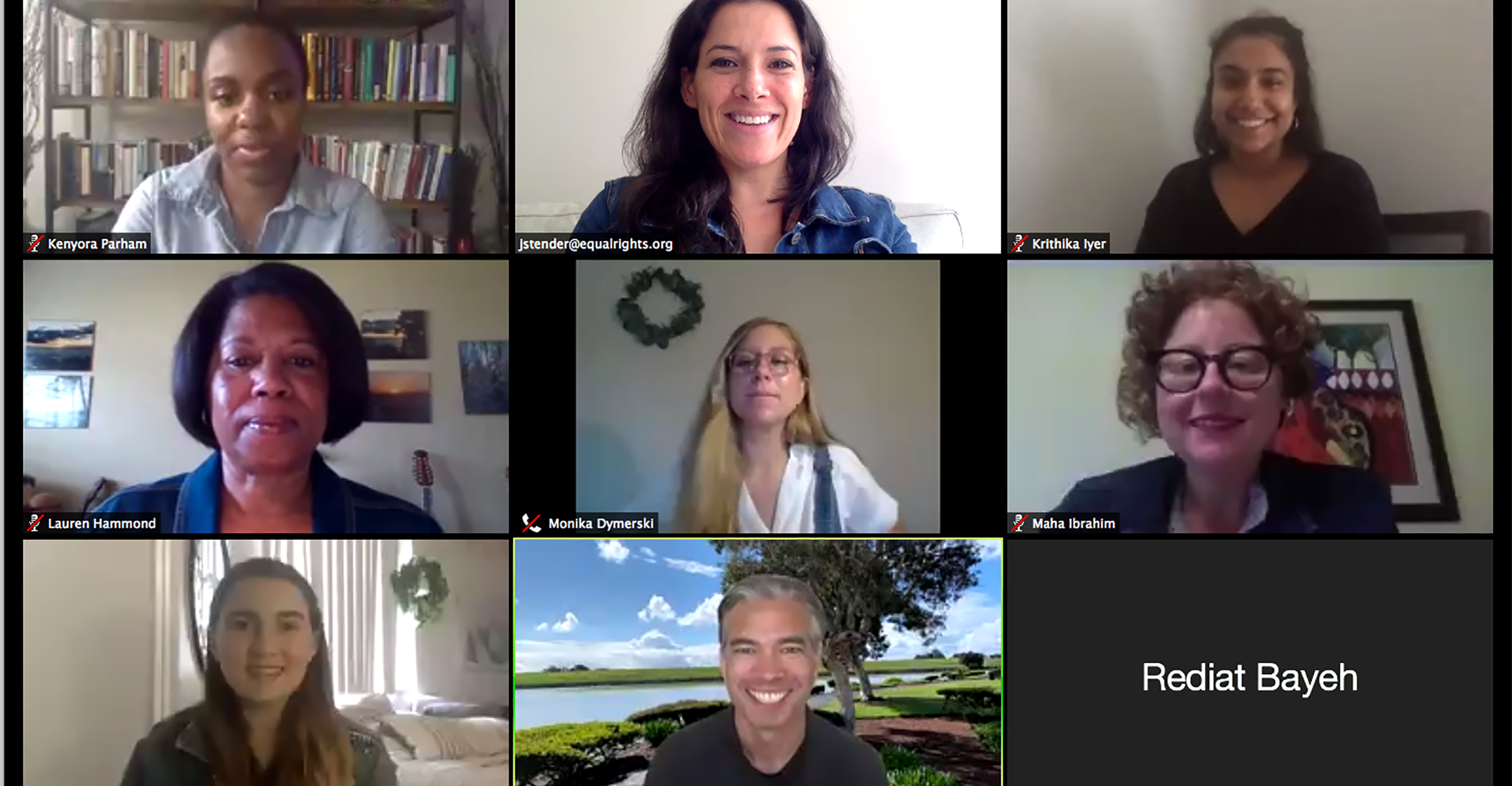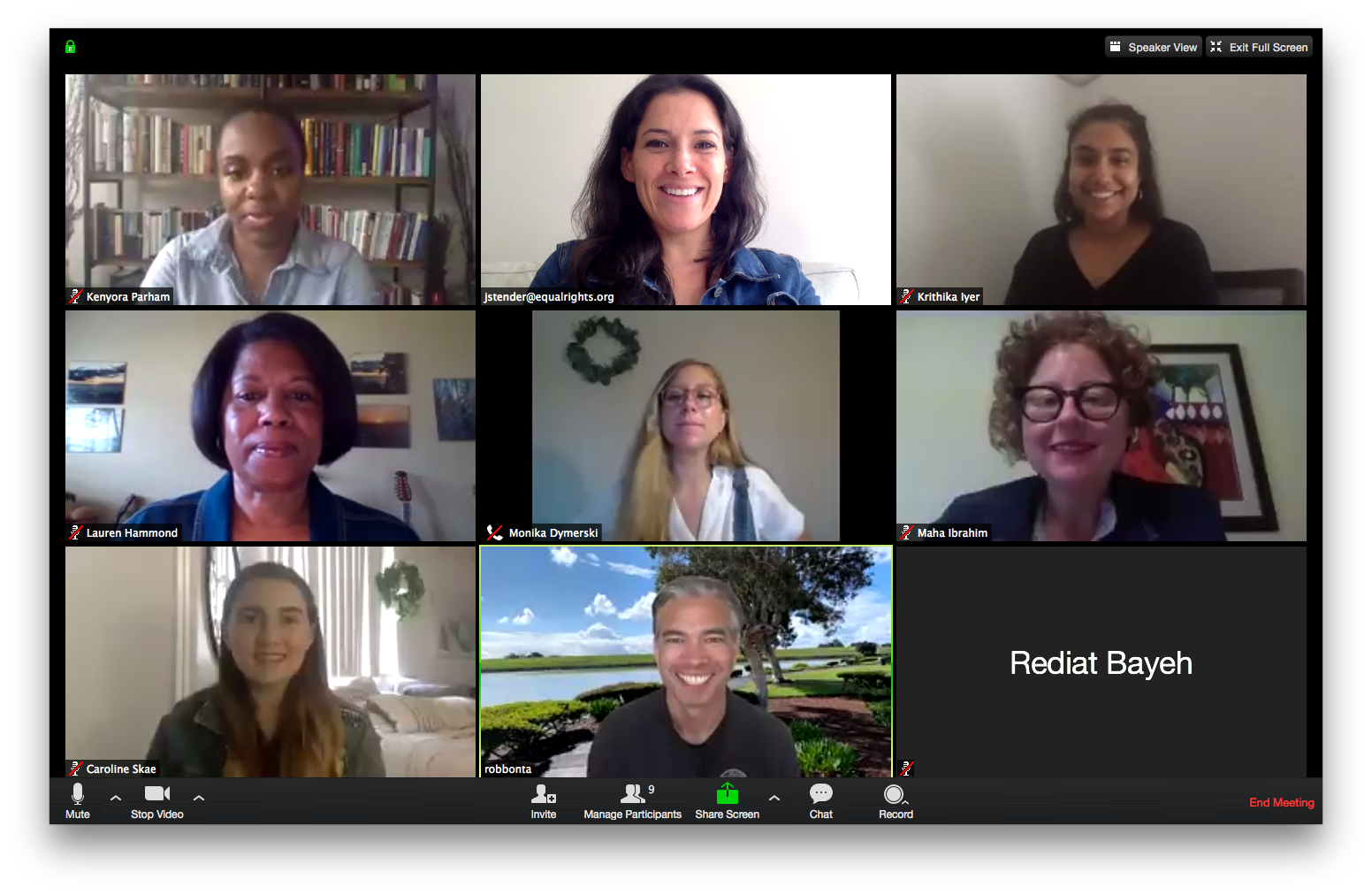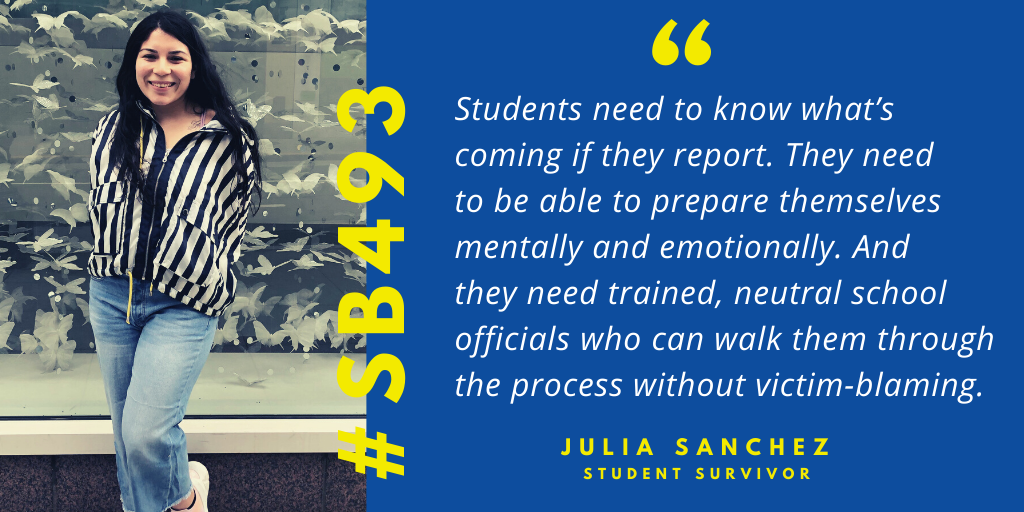

Virtual Advocacy: Civil rights for CA college students in Title IX investigations
On April 29, Equal Rights Advocates, in partnership with student organizers, professional advocates, and passionate supporters spoke via video chat with California Assembly Appropriations Committee members to discuss California Senate Bill 493. Organizations such as Students Against Sexual Assault, End Rape On Campus (EROC) and IGNITE empowered college students to share their personal experiences through a virtual platform.
Legislators were overwhelmingly supportive of the bill and perceptive to student survivors stories. The success of this virtual Advocacy Day has encouraged expansion of online advocacy tools and has continued to inspire mobilizing around SB 493.

Why CA students need SB 493
Sexual harassment, including sexual violence, among college and university students is rampant. 1 in 5 women say they were sexually assaulted in college, and an estimated 62% of women and 61% of men experience sexual harassment during college. Due to underreporting, these numbers are likely much higher.
Existing federal and state student civil rights laws prohibit sex discrimination in education and require schools to respond to allegations of sexual harassment and violence. Unfortunately, there is no guidance in California state law on how to do this. At the federal level, the important guidance on this has been rolled back, and new regulations threaten the civil rights of students everywhere, especially student survivors.
It was already clear that the extremely high rate of college sexual assault, as well as federal attacks, demanded action at the state level. The COVID-19 pandemic has further illustrated the importance of enacting these protections into state law. (Continue reading below)
Provisions of SB 493
SB 493, authored by Senator Hannah-Beth Jackson, would require California institutions of higher education to implement policies and processes to respond to sexual harassment and sexual violence, including making it easier for students to report incidents and requiring transparent procedures for investigating sexual misconduct complaints to ensure a fair and equitable process for all parties. Therefore, this bill would ensure the civil rights of California college students involved in Title IX investigations.
Important provisions of SB 493 include notice requirements so that students know how to report sexual assault, the processes that the school will follow, and available counseling services; as well as required training of school officials involved in the process on trauma informed investigation and hearing practices, and training on implicit bias and the history of racial discrimination in school discipline. The bill provides for interim supportive measures such as housing or class changes, or “no contact orders” that may be necessary to protect students during a pending investigation
Also important, the bill includes provisions that require schools to provide prompt timelines within the complaint process to ensure investigations don’t unnecessarily drag on (which can be retraumatizing), while giving schools the flexibility to determine the exact timelines.

It also clarifies that schools must respond to sexual harassment or violence whether it occurs on or off campus if it could interfere with students’ access to education or create a hostile educational environment. This is critical because sexual assault in off-campus settings (such as sport teams’ travel or social parties) is common and can negatively affect a student’s ability to receive an education.
Finally, the bill requires schools to have transparent procedures for responding to sexual violence complaints to ensure a fair and equitable process for all student by giving both parties equal opportunity to provide information and witnesses and to ask questions of the other party through a process that prevents retraumatization, for example, by allowing only “indirect cross examination” via the submission of written questions to the school investigator or hearing officer.
The COVID-19 Crisis Highlights the Need for SB 493
We’ve been hearing reports of delays in school investigations of sexual violence complaints in the midst of the COVID-19 crisis. In some cases, respondents or their attorneys are taking advantage of the situation to argue that no hearings should be held, despite the fact that classes and other school programs are being held remotely. This causes increased anxiety and stress for survivors while their investigations remain in limbo with no resolution in sight. It also presents the risk of student witnesses graduating, and it may be hard to bring them back for future hearings.
Due to the current pandemic, there has also been an increase in online harassment of students, further demonstrating the need for protections. Finally, we’ve seen that the response of some colleges during this crisis has been to cut funding for women’s sports teams. This illustrates a serious problem that anti-discrimination protections and equity measures are often the first things to be discarded in times of crisis. We therefore need to make sure that schools do not abdicate their responsibility to ensure an education environment free of discrimination and harassment, especially during this time.
When schools fail to respond appropriately to sexual violence, the immediate effect can be student pushout, where survivors are effectively pushed out of an education. One in three survivors who is sexually assaulted in college drops out. Sexual violence can also have long-term, often life-long effects. Schools therefore need this guidance now, and we cannot afford to wait. Our students’ safety depends on it.
ERA is committed to protecting student survivors and our advocacy for SB 493 will continue to move forward. We must continue to center student survivors and those most impacted by the lack of Title IX guidance.
Stand with CA student survivors: Take action to support SB 493!
Stay Connected & Take Action
- Get the Latest News & Information Sign up for Email Updates
- Sign Up for Action Alerts Join the Action Team
- Follow Us

